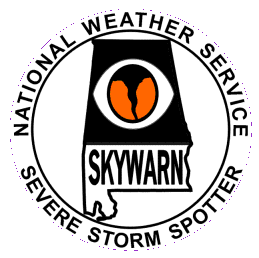

SKYWARN
SKYWARN is a voluntary program developed by the National Weather Service to improve the warning program. SKYWARN volunteers serve as storm spotters for the National Weather Service and local emergency management programs. Keeping their eyes on the sky, volunteers serve as the eyes and ears for the whole community. SKYWARN volunteers come from all walks of life but they all have generally two things in common - an interest in the weather and an interest in serving their community.
SKYWARN is a loosely knit organization. Training in severe storm identification comes from the National Weather Service. Often, another organization, such as emergency management, law enforcement, fire departments or rescue squads, or amateur radio groups, is the backbone of the SKYWARN effort in a particular community. If you are interested in becoming a SKYWARN volunteer, your best bet is to begin with the local emergency management agency in your county.
The National Weather Service needs real time reports of hail size, wind damage, flash flooding, heavy rain, and tornado development, in order to effectively warn the public. Even as new technology allows the National Weather Service to issue warnings with more lead time, spotters will always be needed as links between radar indications of severe weather and ground truth information.
This section of the Birmingham National Weather Service home page provides links and information about the SKYWARN program as it pertains to the county warning and forecast area. This area includes the northern two-thirds of Alabama (49 counties). (click for map).
Spotter Training |
Class Description |
The spotter training course introduces the spotter to the NWS warning system and shows the hazards associated with severe thunderstorms. Spotters are shown what to look for when observing thunderstorms. Examples of downburst winds, wall clouds, funnel clouds, and tornadoes are shown and explained. Local severe weather climatology and basic severe weather meteorology are covered as well. Spotters are also instructed on how to report their observations to the NWS.
The class lasts two hours and features slides, videos, and a video quiz. The class is free and there are no prerequisites for the course. Class materials are provided.
We recommend that all spotters attend the course at least once every two years.
Nat. Hurricane Center
 Alabama
Weather Safety Information
Alabama
Weather Safety Information